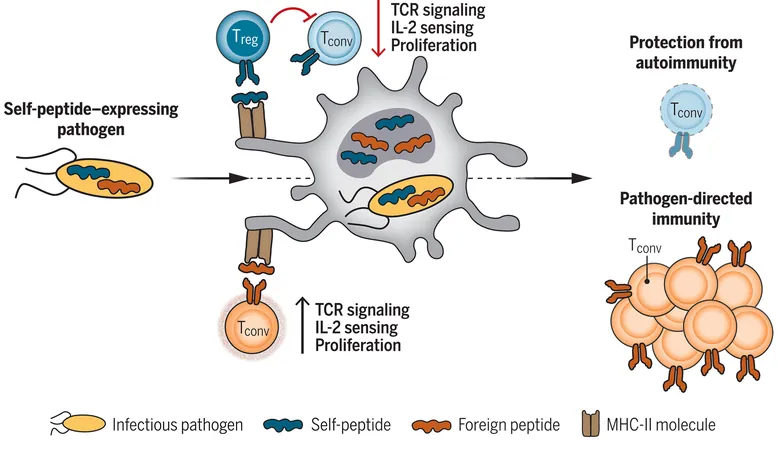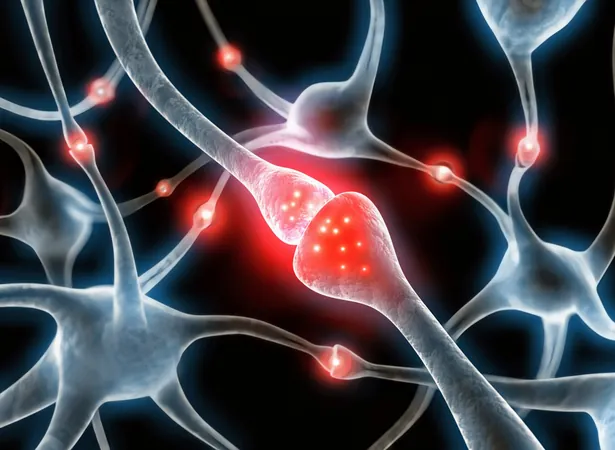
Revolutionary Research Uncovers How "Peacekeeper Cells" Shield Us from Autoimmunity During Infections!
2025-03-24
Author: John Tan
Introduction
In the complex battlefield of our immune system, distinguishing between foreign invaders like bacteria and viruses and the body’s own cells is crucial. When this distinction falters, the immune system may inadvertently launch an attack on its own tissues, leading to autoimmunity—a condition that can cause long-term and often debilitating health issues.
Groundbreaking Research
Exciting new research from the University of Chicago has shed light on the remarkable role of a unique group of immune cells acting as peacekeepers, preventing these dangerous friendly fire incidents. This groundbreaking study, published in the prestigious journal *Science*, not only enhances our understanding of immune regulation amid infections but also opens new doors for potential therapies aimed at preventing or even reversing autoimmune diseases.
White Blood Cells and Their Roles
White blood cells are the unsung heroes of the immune response, with different types carrying out specialized roles. Dendritic cells, for instance, are responsible for capturing proteins from pathogens, breaking them down into recognizable pieces known as antigens, and displaying these on their surface for inspection by T cells—our immune system's sentinels. Among T cells, the CD4+ conventional T cells, or helper T cells, play a critical role in determining if the antigens are foreign or self. Upon encountering foreign antigens, these T cells multiply and activate to eliminate the threat. However, when they encounter self-peptides, the expectation is that they will refrain from attacking.
Role of Treg Cells
During autoimmune responses, however, helper T cells can mistakenly target self-peptides, unleashing chaos within the body. Enter CD4+ regulatory T cells (Treg cells), which act as crucial modulators in this delicate balance, akin to diplomatic peacekeepers, ensuring that the immune system knows when to react and when to stand down.
Research Insights
Dr. Pete Savage, a leading researcher in this study, noted, “Treg cells are vital for maintaining the peace within our immune system.” However, one key question remained unanswered: How do Treg cells determine the difference between a harmless self-peptide and a dangerous pathogen?
Self-Nonself Discrimination
To investigate this, Dr. Savage's team, including postdoctoral fellow David Klawon, focused on a phenomenon termed "self-nonself discrimination." They discovered that Treg cells develop in the thymus, where they are trained to recognize specific self-peptides. When dendritic cells present these self-peptides, properly trained Treg cells swoop in to neutralize the potential activation of harmful T cells.
Startling Findings
Data from the study revealed a startling finding: when Treg cells specific to one particular self-peptide (associated with the prostate) were removed from mice, the absence of these peacekeepers led to the activation of prostate-reactive helper T cells, resulting in autoimmunity. Surprisingly, despite this internal turmoil, the mice's immune responses to foreign pathogens remained intact—suggesting that Treg cells are specifically tailored to control self-reactive T cells while allowing necessary immune responses against infections.
Conclusions and Future Directions
“The striking takeaway here is that Treg cells are like doppelgängers to the disease-prompting T helper cells,” Savage explained. “By selectively keeping these peacekeeper cells in the mix, we can prevent autoimmunity without sacrificing the body's ability to fight infections.”
Traditionally, immunology has championed the notion that autoimmune diseases arise from the elimination of self-reactive T cells. However, Savage argues that this study shows that adequately equipping our immune arsenal with Treg cells could be equally critical.
This shifting perspective could mean a substantial change in how we approach autoimmune diseases: focusing on fostering a robust collection of Treg cells instead of simply eradicating potentially harmful cells.
As researchers continue to explore the intricate dynamics of the immune system, this finding might pave the way toward innovative therapies that not only defend against infections but also safeguard our bodies against the devastating effects of autoimmunity. Stay tuned for further updates as we delve deeper into how we can empower our immune systems to protect both our health and our future!


 Brasil (PT)
Brasil (PT)
 Canada (EN)
Canada (EN)
 Chile (ES)
Chile (ES)
 Česko (CS)
Česko (CS)
 대한민국 (KO)
대한민국 (KO)
 España (ES)
España (ES)
 France (FR)
France (FR)
 Hong Kong (EN)
Hong Kong (EN)
 Italia (IT)
Italia (IT)
 日本 (JA)
日本 (JA)
 Magyarország (HU)
Magyarország (HU)
 Norge (NO)
Norge (NO)
 Polska (PL)
Polska (PL)
 Schweiz (DE)
Schweiz (DE)
 Singapore (EN)
Singapore (EN)
 Sverige (SV)
Sverige (SV)
 Suomi (FI)
Suomi (FI)
 Türkiye (TR)
Türkiye (TR)
 الإمارات العربية المتحدة (AR)
الإمارات العربية المتحدة (AR)